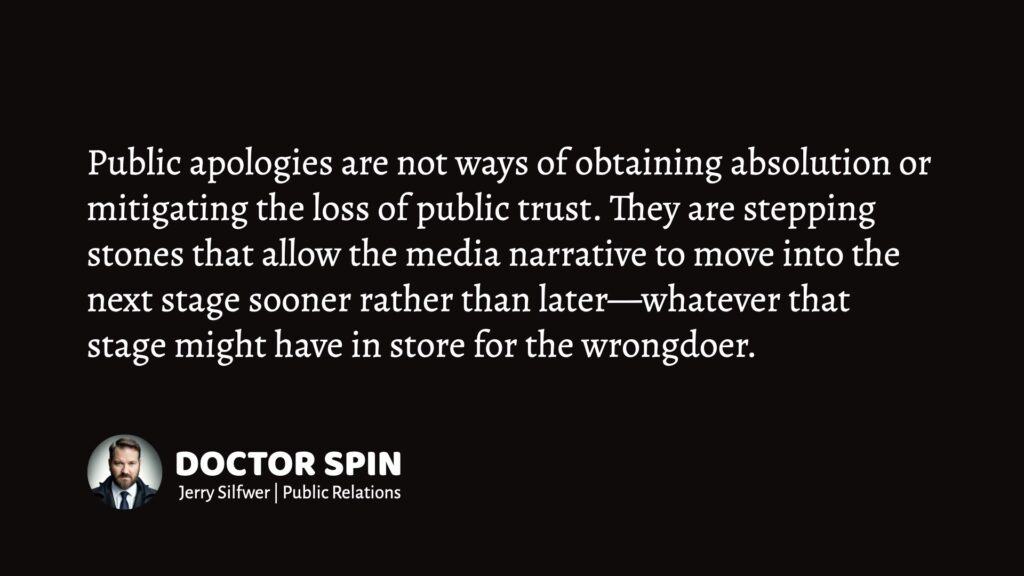PR agency Bell Pottinger issued an apology — and it’s horrible.
Here’s the backstory:
Oakbay Capital in South Africa hires a reputation management agency, Bell Pottinger. According to Bell Pottinger’s Wikipedia entry, the agency has had problems managing its reputation. Less than a year later, both Oakbay Capital and Bell Pottinger are accused of purposely stirring up racial divisions.
Following a perfect storm of social media criticism, Bell Pottinger issued a public apology.
Bell Pottinger’s Statement
I’ll run through Bell Pottinger’s letter of apology, paragraph by paragraph:
“Three months ago, Bell Pottinger announced that it had decided to cease work for Oakbay Capital. We had worked for them for a year, following a competitive bid process.”
Of course, emphasising “three months” is an attempt to make this seem like old news. But if they had enough information to end the partnership three months ago, why did it take them three months to explain?
Then:
“When we terminated our work with Oakbay, we said we were doing so because of increasingly strong social media attacks on our staff and our business from South Africa, and that we regarded the criticisms of what our team had done as unfair.”
In this passage, Bell Pottinger says they still don’t hold Oakbay Capital responsible for anything. And they’re not blaming themselves. Instead, they’re blaming the angry social media mob, accusing them of unfairly attacking their employees.
Then:
“These attacks on, and criticisms of, our staff continued and were clearly the result of strong and sincere anger. Most seriously, it was said that we had supported or aided campaigns to stir up racial division in South Africa. Therefore, we called in the leading independent international law firm, Herbert Smith Freehills LLP, to review the account and the work done on it. That investigation is still continuing and will be completed in the next few weeks. We intend to publish the findings of that report and take appropriate action.”
Bell Pottinger is lawyering up. They acknowledge people’s anger, though, but they do so with a condescending, “At least they seem to believe what they’re saying.”
Then:
“However, we have already been shown interim evidence which has dismayed us. Much of what has been alleged about our work is, we believe, not true – but enough of it is to be of deep concern.”
Has Bell Pottinger done anything wrong, or haven’t they? This is, of course, deliberately vague and unclear. Why not describe what exactly they’re deeply concerned about?
Then:
“There has been a social media campaign that highlights the issue of economic emancipation in a way that we, having now seen it, consider to be inappropriate and offensive. At various points throughout the tenure of the Oakbay account, senior management have been misled about what has been done. For it to be done in South Africa, a country which has become an international beacon of hope for its progress towards racial reconciliation, is a matter of profound regret and in no way reflects the values of Bell Pottinger.”
What’s worse? Everyone at Bell Pottinger hasn’t seen anything of their campaign until now, or “senior management has been misled” without explaining who misled them. And to move from there to appointing themselves and their values as victims… well, that isn’t very respectful. And I don’t even live in South Africa.
Then:
“Though the inquiry is ongoing, we have dismissed the lead partner involved and suspended another partner and two employees so that we can determine their precise role in what took place. As soon as we were made aware that we had been misled and that work was being done which goes against the very core of our ethical policies, we acted immediately.”
If Bell Pottinger were misled, which is a recurring theme of this letter, why are they firing and suspending senior staff? It makes no sense, given the direction of this letter.
Then:
“At Bell Pottinger – a proudly diverse and international team – we have good, decent people who will be as angered by what has been discovered as we are.”
Having a diverse and international team is in no way making it impossible for a company to act up. And, again — they’re pushing themselves as victims of not knowing what’s going on at their agency. From a strategic standpoint, I fail to see how that’s any better.
Then:
“We wish to issue a full, unequivocal and absolute apology to anyone impacted. These activities should never have been undertaken. We are deeply sorry that this happened.”
But why apologise, then? If Bell Pottinger hasn’t done anything wrong and is the victim of this situation— why are they apologising? It is, after all, “a full, unequivocal and absolute apology.” They won’t regret causing harm; they regret that this “happened.”
Then:
“James Henderson Chief Executive”
No contact information. Meaning: “Please don’t bother us with this anymore, you evil social media mob.”
No Bell Pottinger, It’s Not Good Enough
Bell Pottinger’s excuse letter deserves to become a modern classic of a “non-apology.” A yucky we’re-sorry-that-you’re-sorry.
Apart from being disrespectful, it’s a known fact in the public relations industry that non-apologies only make people angrier. We should advise against these types of corporate statements.
Either you acknowledge your guilt and apologise. Or, if you’ve been wrongfully accused — you stand your ground and fight. Issuing non-apologies like these is just bad public relations.
Bonus: The Public Apology
The Public Apology
A public apology is, by nature, an ambiguous statement; it ranges from submissive remorse to a chevalier’s trope of humbly expressing that the outcome was all that one could muster — despite best efforts.

“Public apologies function as ritualistic public punishment and humiliation, rather than forgiveness, to enforce ethical standards for public speech.”
Source: Rhetoric Society Quarterly 1Ellwanger, A. (2012). Apology as Metanoic Performance: Punitive Rhetoric and Public Speech. Rhetoric Society Quarterly, 42, 307 — 329. https://doi.org/10.1080/02773945.2012.704118
The audience will not consider anyone’s public apology until they understand why someone did what they did and how they feel about doing it. This ambiguity is why saying, “I apologise” is never enough — you must also express regret and explain yourself.
Anatomy of an Apology
Types of Public Apologies
There are several different types of apologies to avoid. Unfortunately, as far as public apologies go, these types of public apologies are widely used — often with devastating PR consequences.
From a PR perspective, I recommend only one type of apology:
Moving Into the Next Stage
Apart from an honest delivery, this is what a wrongdoer must understand about the strategic use of a public apology as a strategic tool:
Public apologies are not a method of obtaining absolution or mitigating the loss of public trust. Forgiveness and trust must be earned separately and in the long term.
A public apology is a tool to allow the media narrative to move into the next stage sooner rather than later — whatever that stage might hold in store for the wrongdoer.
Learn more: The Public Apology

THANKS FOR READING.
Need PR help? Hire me here.

Subscriber-Only: Adobe’s Not Sorry
Annotations
| 1 | Ellwanger, A. (2012). Apology as Metanoic Performance: Punitive Rhetoric and Public Speech. Rhetoric Society Quarterly, 42, 307 — 329. https://doi.org/10.1080/02773945.2012.704118 |
|---|


